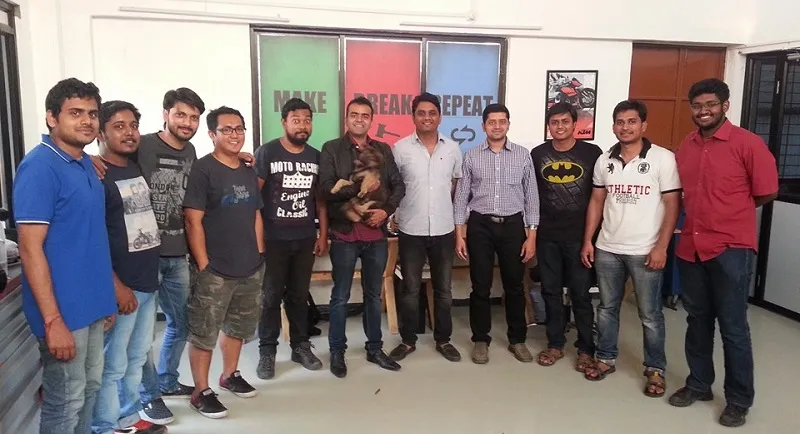The first electric motorcycle in India that you never heard of just got angel funding
Tork Motorcycles, which develops electric motorcycles, raised an undisclosed amount of angel funding from a host of investors including Bhavish Agarwal and Ankit Bhati, Co-founders of Ola and Harpreet Grover, Co-founder and CEO of CoCubes. The funding raised will help the firm get their first prototype out in the market.

Founded in 2009 by Kapil Shelke, Tork is currently focusing on creating practical electric mobility solutions in India. In the past, the firm has proved its mettle on international circuits, by finishing third at the prestigious Mecca of Electric Racing, The Isle of Man TT, and has also won the world's premier electric motorsport race series, TTXGP.

After releasing their prototype, scale and setting up manufacturing units is next in succession for this electric vehicle company. Additionally, Kapil Shelke, Founder and CEO, doesn’t deny the possibility of raising another round of funding later this year; expecting to start manufacturing by the third quarter of this year.
If all goes as planned, their first model – T6X – is targeted to launch early next year. The motorcycle has several features like cloud connectivity, integrated GPS, and in-built navigation capabilities, thereby making it the first smart motorcycle. Connected with a mobile app, the platform will map driving cycles and provide real-time information of the bike.
Focusing on having 2x range, better than any other electric vehicle in the market, T6X is engineered to run above 100 kilometres on a single charge. Equipped with fast charging capabilities and being completely electric will make the vehicle operation as much as 10 times cheaper than its petrol counterparts.
But, while being such a capital extensive business, how is Tork managing the investments? Kapil says
“This is an aspirational brand for India. We don’t consider ourselves as a regular OEM provider. Rather, we look at ourselves as a consumer-oriented business. This makes scaling up easier than other commercial automotive part providers. Yes, we agree that it is a little capital intensive, but our experienced engineering team is helping us break through these challenges.”
The key to their cost lies in their engineering. The firm has adopted only one moving part in their modelling. This further reduces the cost of the vehicle, without comprising on the power and speed. But their major focus, as of now, is getting the bike on road at the earliest. Not divulging much information, Kapil says that 90 per cent of T6X’s price is decided, while they are still talking to other vendors for procuring the mechanic parts.
Speaking about the funding Harpreet says
“Electric vehicles are the future. Drop in battery prices, rising sensitivity around emissions, and government’s focus on the sector will fuel demand in India. With a fabulous seven-year track record, the team is using that experience to build a connected motorcycle for the everyday user.”
The first electric smart scooter
Being aspiration brands in their own regard, it could be said that Tork’s working challenges are similar to India’s first smart electric scooter Ather.
But things weren’t smooth for Ather, as well. They ran short of funds in the second half of 2014 only to receive $1 million from Flipkart founders – Sachin and Binny Bansal – by December 2014. In May 2015, the electric scooter also scooped up a $12 million round from Tiger Global. However, according to Tarun Mehta, Co-founder of Ather, investors weren’t willing to take a risk on the idea of building a smart Indian electric scooter. This is a big barrier to entry for many players vying for the market.
Additionally, Ather launched their scooter on February 23, 2016.

Policy bump
In 2013, the Government of India announced the “National Electric Mobility Mission Plan (NEMMP) 2020”; however, the delay in implementing the same has reduced the number of electric two-wheeler manufacturers from 28 in 2011-12 to seven in 2014-15, according to a report by National Institute of Urban Affairs.
This is further validated by the decline in sales of electric vehicles from 1,00,000 in 2011-12 to 16,000 in 2014-15.
But there still seems to be some hope with the government targeting 100 GW of solar by 2022, and planning to put seven million electric and hybrid vehicles on the road each year by 2020. This could be seen through states like Delhi-NCR, Bihar, West Bengal, and Orissa, which have witnessed the operation of 2,50,000 e-rickshaws.
Other electric vehicles include Mahindra E20, India’s first electric vehicle, priced at Rs 4.79 lakh, Gujarat-based Yo Bykes and others including Hero RNT Diesel Hybrid Scooter, Hero Splendor iSmart, Hero Leap, Mahindra GenZe, TVS Qube, and Hyosung ST-E3 EVA.
Coimbatore-based Ampere Electric is also an active player in this space though their e-scooters.
Are you working for/running a startup? Then here's your startup's chance to win big! Apply now to showcase your startup on India's biggest launchpad, get on a TV show & more! Click here.







